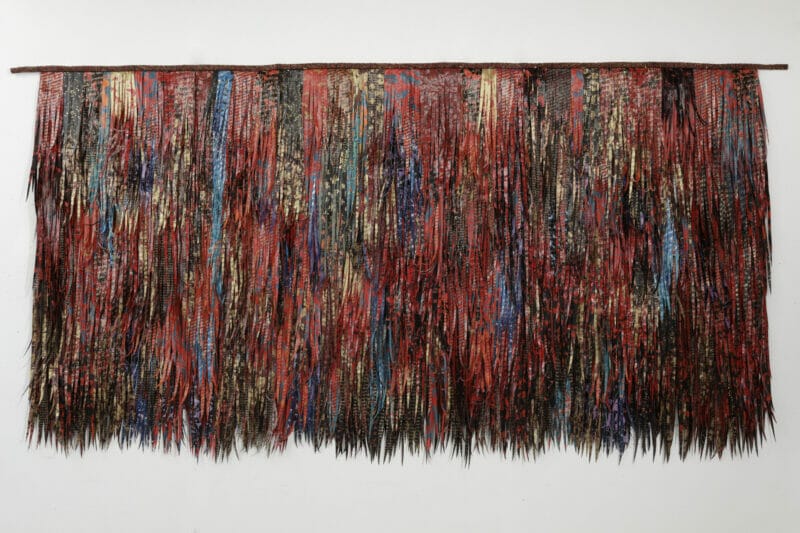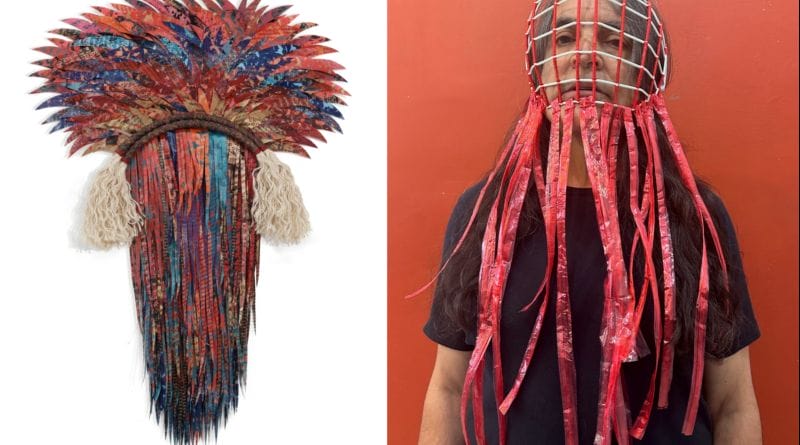INVISIBLE MATTERS – DEBORAH KRUGER and MICHAEL PRIBICH – Follow the Thread
INVISIBLE MATTER
In nature, nothing can be understood if considered apart from the whole: everything on this planet is interconnected within what we commonly call the web of life. Edward Lorenz, on the other hand, already analysed the ‘butterfly effect’ in the last century. Any change, however slight, within a system generates consequences that are difficult to predict. These effects are more significant the more complex the system in which the change occurs. On the other hand, Newton’s third law states that every action generates a reaction. So why should human behaviour escape these dynamics?
INVISIBLE MATTERS is an exhibition bringing into dialogue two artists whose research and practice appear, at first glance, to focus on non-complementary themes. Michael Pribich investigates the topic of work and its social and cultural connections, also concerning migration dynamics. Deborah Kruger explores the impact of habitat fragmentation through the loss of animal species and the contextual erasure of the culture and language of many small indigenous communities.
Let us observe the two phenomena from the perspective of their connection within a sole system. Behind both of them, we can easily identify a system of industrial, economic, financial, media, etc. power that tends to exploit any and all resources to the utmost to generate wealth for a small number of people, triggering more or less direct, more or less predictable, processes of environmental, social and cultural impoverishment.
It is evident that, although the long-term effects are widespread, it is the most fragile and vulnerable ones who are affected and overwhelmed by the consequences, regardless of the species to which they belong. Both artists understand art as a vehicle for continuous evolution, an opportunity to shed light on the dark folds of any macro system and give voice to the issues that remain trapped in its meshes.
For Pribich, Art Saves Lives: it is a means to observe issues deeply and to create a platform for discussion that triggers change. In the dynamics of migrations, he traces the underlying crises that often coincide with environmental ones. He uses everyday and domestic materials that he deconstructs in a process that, on the one hand, recognises human fragility and, at the same time, celebrates the constructive and creative power of work. His works draw attention to the invisible workers living among us, to the dignity of what they do and do well, acting positively on reality and thus changing the course of events.
To Kruger, art can give form to absence and loss: it allows us to see what is invisible due to superficiality, distraction or cultural or institutional choices. Her works are vehicles to raise awareness of the impact of human decisions on ecosystems and the destruction of natural environments, restoring the palpable echo of the biodiversity we are losing. Using recycled materials, the artist urges further reflection on the individual responsibility in reversing this drift through our behaviour and choices.
Art can and must, indeed, make the INVISIBLE MATTERS visible by contributing, one work at a time, to changing the flow of history.

MICHAEL PRIBICH
Michael Pribich is a visual artist living in New York City with artist Esperanza Cortes. He was born and raised in Northern California. He is interested in the artist’s role in advancing ideas that lead to continual growth and change. His work uses labor to address themes of displacement and migration in both rural and urban settings. He explores the idea that labor can be viewed as cultural production, resulting in an expanded social space. He has participated in exhibitions and artist residencies throughout the USA, Mexico, Central Asia, and India. Recent exhibitions include The Shape Of Things To Come at Jadite Gallery, NYC; Wheel Of Fortune at Womb Space in Mexico City; and presentation at the 360 Xochi Quetzal Residency in Chapala, Mexico. He completed a 2023 summer residency with the Pine Meadow Ranch Residency in Sisters, Oregon. In 2021 he completed a summer residency with Nars Foundation in Brooklyn. Also in 2021 he participated in a workshop in Sarajevo with Kuma International and Brodac Gallery dealing with memory remembrance and contemporary forms of memorialization. Pribich has produced art projects with the Public Works Departments in Sacramento and Woodland, California. He has received a Pollock Krasner Award, and a Fulbright Award recommendation.
DEBORAH KRUGER
Patterning has influenced Deborah Kruger’s work since studying textile design at Fashion Institute of Technology in New York. The award-winning artist has taught, lectured and exhibited throughout Mexico, Europe, USA, Canada and Australia since the 1980s. Her latest artwork focuses on the tragic losses of the 21st century, specifically the impacts of climate change and habitat fragmentation on global bird extinction and loss of indigenous culture. The feathers in her textile paintings, sculptures and installations are fabricated from recycled plastic bags and hand silk-screened with images distilled from her drawings of endangered birds. These feathers are overprinted with text in endangered indigenous languages, such as Yiddish, Ladino, Tzotzil, and Cho’lol, whose last living speakers are in steep decline. Making art from recycled materials reminds us that we can all do something to reduce our footprint. Recent career highlights: Finalist for 2023 Arte Laguna Prize and exhibition in Venice, Italy; 2023 Follow the Thread joint exhibition sponsored by ArteMorbida in New York City; 2023 World of Threads featured artist in Toronto, Canada; 2023 two-person exhibition “Text & Textiles” at Shelley Heffler Gallery, Cathedral City, CA; 2022 solo exhibition “Avianto” at the Train Station Museum in Chapala, Mexico; 2021 solo exhibition “Plumas” in Mexico City; 2021 Art Textile Biennial in Australia, 2021 Rufino Tamayo Bienal in Mexico City. The Museum of Arts and Design in New York City just acquired two large environmental pieces which they will exhibit in 2024. Residencies: 2021 Hypatia-In-The-Woods Residency, Shelton, WA. Kruger has a team- based studio in Chapala, Mexico where she provides jobs and empowerment to local Mexican women.

